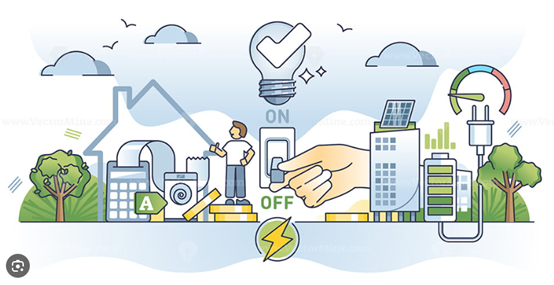Written by Riki Argyropoulou, junior surveyor at Wattcrop.
As the global community grapples with the pressing challenges of climate change and the need for sustainable energy sources, the spotlight is increasingly turning towards renewable energy. While the transition to renewable energy is crucial, the role of energy efficiency in this paradigm shift cannot be overstated. Energy efficiency serves as a linchpin in the successful adoption of renewable energy, offering a myriad of benefits that extend beyond environmental considerations.
Understanding the Synergy
Renewable energy sources, such as solar, wind, hydro, and geothermal power, hold tremendous promise for reducing our reliance on fossil fuels and mitigating the impacts of climate change. However, unlocking their full potential requires addressing the inherent intermittency and variability of these sources. This is where energy efficiency steps in as a key player.
Efficient energy use complements renewable energy by optimizing consumption patterns and reducing overall demand. For instance, advancements in energy-efficient technologies for buildings, transportation, and industrial processes can significantly lower the energy load on the grid. This not only enhances the reliability of renewable energy sources but also contributes to a more resilient and sustainable energy infrastructure.
The Economic Imperative
Energy efficiency is not merely an environmental concern; it also makes economic sense. By improving energy efficiency, businesses and households can reduce their energy bills, leading to substantial cost savings over time. This economic incentive acts as a powerful driver for the adoption of energy-efficient technologies, creating a positive feedback loop that supports the wider integration of renewable energy.
Governments and businesses alike are increasingly recognizing the economic benefits of energy efficiency. Policies and incentives promoting energy-efficient practices and technologies are being implemented globally. This not only fosters innovation in energy-efficient solutions but also accelerates the transition towards a cleaner and more sustainable energy landscape.

Enhancing Energy Security
Energy efficiency is a cornerstone of energy security. By minimizing waste and optimizing energy use, nations can reduce their dependence on foreign energy sources and enhance their energy resilience. This is particularly crucial in a world where geopolitical uncertainties and resource constraints pose challenges to traditional energy supplies.
Renewable energy, coupled with energy efficiency measures, can contribute to a more decentralized and resilient energy infrastructure. Localized renewable energy systems, supported by energy-efficient technologies, provide a hedge against disruptions and ensure a more reliable energy supply in the face of unforeseen events.
Challenges and Solutions
Despite the evident benefits, several challenges hinder the widespread adoption of energy efficiency measures. One primary obstacle is the upfront cost associated with implementing energy-efficient technologies. Businesses and individuals may be deterred by the initial investment, even if the long-term savings are substantial.
To overcome this barrier, governments, and financial institutions need to play a pivotal role in providing incentives, subsidies, and favorable financing options for energy-efficient initiatives. Additionally, raising awareness about the long-term economic benefits and environmental impacts of energy efficiency is essential to drive consumer demand.
Innovation and research are also critical in overcoming technological barriers and developing more cost-effective energy-efficient solutions. Governments, private enterprises, and research institutions must collaborate to advance technologies that improve energy efficiency across various sectors.
The transition to renewable energy is a complex and multifaceted challenge that demands a holistic approach. Energy efficiency emerges as a linchpin in this transition, offering a range of benefits that extend beyond environmental considerations. By optimizing energy use, reducing waste, and enhancing overall efficiency, we can amplify the impact of renewable energy sources and build a more sustainable and resilient energy future.
The synergy between energy efficiency and renewable energy is not just a theoretical concept but a practical and achievable goal. Through a combination of policy support, technological innovation, and public awareness, we can unlock the full potential of this symbiotic relationship, paving the way for a cleaner, more efficient, and sustainable energy landscape for generations to come.
Read more interesting articles in our news page!

